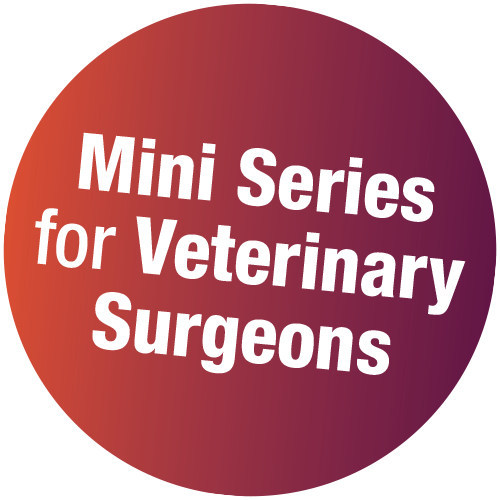MS111 – Soft Tissue Surgery Case Challenges for Advanced Practitioners Mini Series
£447.00 (+VAT)
12 months access to recordings and course materials is included. Please note that these are webinar recordings and not live events. Full details on how to access the Mini Series will be emailed to you.
This Mini Series is tailored towards Advanced Practitioners and those studying towards Advanced Practitioner status
- Join Alison Moores BVSc(Hons) CertSAS DipECVS MRCVS for three 2-hour online sessions and get expert advice on challenging cases
- Comprehensive notes to downloaded
- Self-assessment quizzes to ‘release’ your 8 hours CPD certification (don’t worry, you can take them more than once if you don’t quite hit the mark first time)
- A whole year’s access to recorded sessions for reviewing key points
- Superb value for money – learn without travelling
- Watch the recordings on your iPad!
Programme
Session 1:
Emergency Surgery of the Urinary Tract
Many conditions of the urinary tract present as emergencies. Obstruction and urinary tract rupture rapidly lead to life-threatening azotaemia and blood gas/electrolyte abnormalities that must be corrected before anaesthesia. Urinary diversion techniques are useful to allow animals to be stabilised prior to definitive surgery.
What you’ll learn:
- Medical management of blocked animals prior to anaesthesia
- Tips on unblocking cats and dogs with urethral obstruction, including retrohydropropulsion
- Emergency urinary diversion techniques for animals that can’t be unblocked
- Pigtail catheters
- Cystotomy tubes via mini laparotomy
- The urethral tear – how to avoid it, diagnosis and surgical options
- Performing perineal urethrostomy in cats and scrotal urethrostomy in dogs – hints and tips
- Additional case studies
- Unusual presentations of urolithiasis
- Urinary tract trauma
Session 2:
Blunt and Penetrating Trauma
In this session, we’ll use a series of cases to demonstrate how some complex and severe injuries and trauma were managed. The presentation will include plenty of photographs to demonstrate how these cases should be assessed on arrival, as well as the emergency surgery they underwent and discussion of post-operative management. We’ll explore and explain the potential complications and difficulties in dealing with these types of case.
Examples of cases include:
- Oropharyngeal stick injuries
- Penetrating stick injuries of the thoracic wall
- Bite wounds
- Prepubic tendon /body wall rupture
- Airway trauma
What you’ll learn:
- Emergency management of penetrating trauma cases, including placement of chest drains, blood transfusions and anaesthetising the critical patient
- Lavage and debridement techniques; managing open wounds
- How to explore a neck wound and diagnose/manage oesophageal penetration
- Differentiating penetrating tracheal wounds from other neck wounds and decision making in repair techniques
- How to repair body wall ruptures
- Potential complications of treating injuries, how to avoid them and how to treat them if they occur
Session 3:
Advanced Gastrointestinal Surgery
Gastrointestinal surgery is commonly performed in general practice and vets will undertake gastrotomy and enterotomy early in their careers. However mistakes can occur and some cases can prove more challenging. This session will include some basic information on improving suturing techniques before moving to more complex cases including the use of stapling devices to create a functional end-to-end anastomosis, managing the dehisced enterotomy/enterectomy site with septic peritonitis and a case example of linear foreign body in the dog. Other case examples will include small intestinal, caecal, colonic and rectal mass resection.
Perineal hernia/rupture occurs in some entire male dogs. Case examples in this webinar will include managing bladder entrapment within the hernia and use of a semitendinosus muscle flap after failure of a standard repair with an internal obturator flap.
Anal sac apocrine gland adenocarcinoma may have different clinical presentations. Management of hypercalcaemia, resection of the anal sac mass, diagnosing and treating metastasis and adjuvant chemotherapy will be discussed.
What you’ll learn:
- Optimal suturing skills for intestinal surgery
- How to perform a stapled intestinal anastomosis
- Managing intestinal surgery dehiscence
- Medical management of septic peritonitis prior to surgery
- Managing a linear foreign body
- Surgical procedures for managing complicated perineal hernia/rupture including cystopexy, colopexy and semitendinosus flaps
- Performing anal sacculectomy for anal sac apocrine gland adenocarcinoma
- Adjunctive treatment options for anal sac apocrine gland adenocarcinoma
The price includes all 3 sessions, notes and quiz – 8 hours of CPD
*No traffic jams, accommodation hassles, pet or childcare, rota clashes, locum fees ……….. just great CPD and a valuable ongoing resource.
Course Feedback :
“Picked up a few tips – not using wet-to-dry dressings and good visual of semitendinosus flap.”
“Really good quality speaker with clear pictures and helpful videos.”
“This was useful in refereshing my knowledge from my postgraduate certificate a few years ago. This just brings the important information to the front of my mind when dealing with complex surgical case and wounds!”
If you would prefer to reserve your place for 7 days whilst you arrange payment or check your commitments then click here



